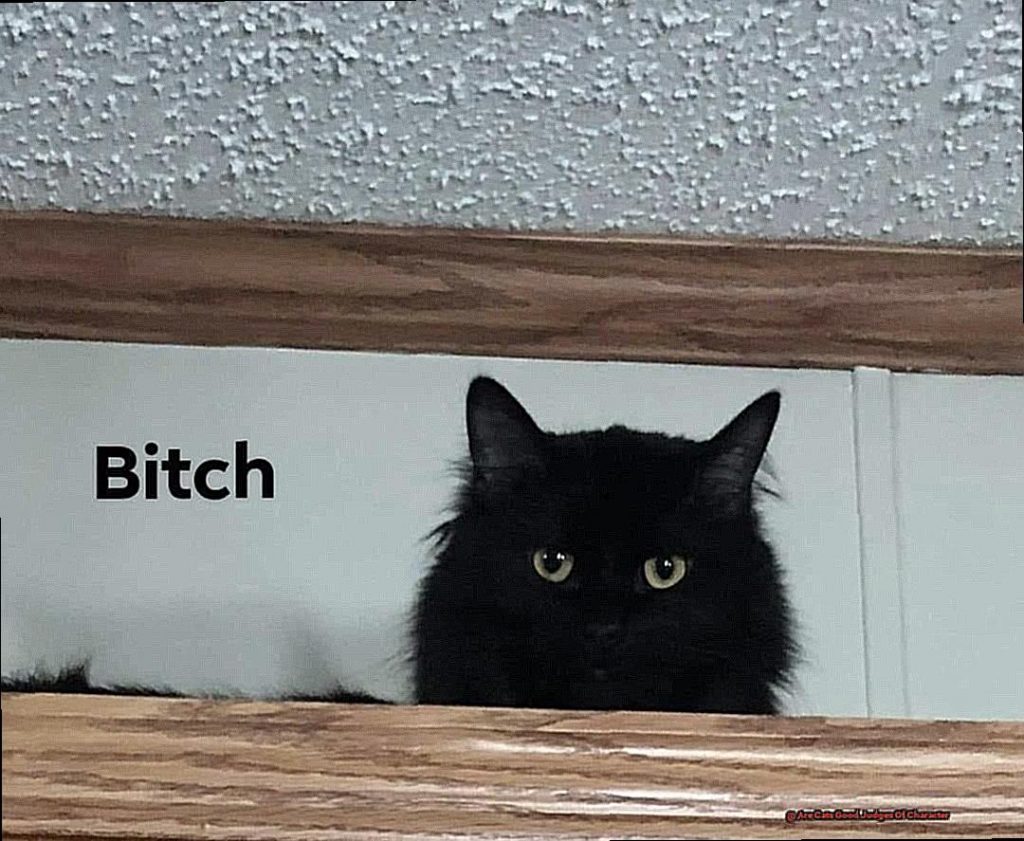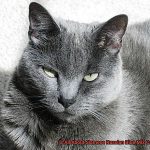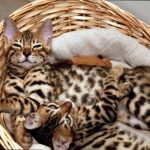Mysterious, independent creatures that have captured our hearts and left us constantly wondering what exactly goes on in their minds. But could they also possess the ability to judge human character?
It’s a question that has sparked heated debates among cat owners and behavior experts alike. Some swear by their feline’s keen intuition, claiming that they can sense when someone is trustworthy or not.
Others dismiss this notion as pure fiction, believing that cats are simply creatures of habit and routine. So, who’s right?
Let’s dive into the intriguing world of cats and uncover whether they truly are skilled judges of character or if it’s just another myth surrounding our beloved furry companions.
Are Cats Good Judges Of Character?
Contents
As someone who has studied and observed cats for years, I can confidently say that yes, cats do have a unique ability to assess a person’s character.
So how exactly do cats judge character? Let’s break it down.
Observation:
Cats are highly observant creatures. They use all their senses to gather information about their surroundings and the people in it. This includes body language, tone of voice, and energy. They pay close attention to how someone carries themselves and how they interact with others. This keen observation allows them to pick up on subtle cues and changes in behavior.
Intuition:
In addition to being excellent observers, cats also possess a strong intuition. This is likely due to their instinctual nature as hunters. They can sense when someone is feeling tense, anxious, or even deceitful. This could be because they are attuned to changes in energy or simply because they are perceptive creatures.
Self-Preservation:
Cats also have a strong sense of self-preservation. They are cautious creatures and will not easily warm up to someone they perceive as a threat. This can be seen as being judgmental, but it is actually a survival instinct. Cats are naturally wary of unfamiliar individuals and will take their time getting to know someone before fully trusting them.
Bonding with their humans:
One interesting factor that supports the idea of cats being good judges of character is their ability to form strong bonds with their owners. Cats are very selective about who they trust and allow into their personal space.
This could be because they have a sense of who is trustworthy and who isn’t based on their interactions with different individuals. After all, cats are known to be fiercely loyal to their owners and will protect them from harm.
However, it is important to note that cats are not infallible judges of character. They can also be influenced by their own experiences and biases, just like humans. So while they may have a general sense of someone’s character, it may not always be accurate.
The observational skills of cats in assessing people
Maybe they purred and rubbed against one guest, while hissing and hiding from another. This is because cats have highly developed observational skills that allow them to assess the character of humans.
Cats are known for their keen sense of sight and hearing, which allows them to be extremely observant creatures. They are able to pick up on subtle cues and body language from humans, giving them insight into a person’s character. This includes facial expressions, tone of voice, and even body posture. So when your cat meets someone new, they are already gathering information about that person through these visual cues.
But it’s not just what they see that helps them form an opinion about someone. Cats also have a strong sense of smell, which plays a big role in their assessment of people. They can pick up on pheromones and other scents that humans may not be aware of. This can give them a deeper understanding of a person’s emotions and intentions.
In fact, studies have shown that cats are able to distinguish between friendly and unfriendly people based on these cues. They can also differentiate between those who are likely to provide them with food and those who may pose a threat. This heightened sense of observation is believed to be a survival mechanism for cats in the wild. They must be able to quickly determine if another animal or human poses a threat in order to protect themselves.
But it’s not just humans that cats can assess. They have also been observed assessing the personalities of other animals, such as dogs or other cats. This helps them establish hierarchies within their social groups. So if your cat doesn’t get along with your friend’s dog, it may not be personal – they just have different personalities.
However, it’s important to note that cats are not infallible judges of character. Their assessments may be influenced by past experiences or their own personal preferences. Just like us, they may have certain biases or tendencies that can affect their judgment.
Intuition and its role in a cat’s judgement of character
As cat owners, we often marvel at our feline friends’ ability to sense danger and hunt prey with precision. But did you know that their heightened sense of intuition also allows them to accurately assess the character and intentions of humans? In this section, we’ll dive deeper into how cats use their intuition to read people and make judgements about them.
The Power of Intuition in Cats
Cats have a powerful intuition that allows them to pick up on subtle cues in their environment. This is what makes them such great hunters and allows them to sense potential danger. But it also plays a role in their ability to judge the character of humans.
Cats Can Sense Fear and Anxiety
Have you ever noticed your cat avoiding someone who is nervous or anxious? It’s not just a coincidence – cats can sense fear and anxiety in humans. This may be due to the fact that these emotions often come with certain behaviors, such as fidgeting or a racing heartbeat, that cats can pick up on. In the wild, these behaviors could indicate a potential threat, so it makes sense that cats would be wary of someone exhibiting these signs.
They Pick Up on Body Language Cues
Cats are also incredibly observant creatures and can pick up on body language cues that humans may not even be aware of. For example, they may notice subtle shifts in posture or facial expressions that indicate a person’s true emotions. This ability to read body language plays a big role in their judgement of character.
Positive vs Negative Energy
Studies have shown that cats are more likely to approach and interact with people who are calm and confident, rather than those who are nervous or anxious. This suggests that they can sense positive or negative energy from a person and are drawn to those who emit positive vibes.
So, if your cat takes an immediate liking to someone, it could be a sign that this person has good intentions.
They Sense When Something is Off
Cats have a strong bond with their owners and can often sense when something is off with them. Whether it’s an illness or emotional distress, cats can pick up on changes in our behavior and emotions. This further demonstrates their ability to read and judge the character of humans.
The self-preservation instinct and how it affects a cat’s perception of people
The self-preservation instinct is a powerful force that drives all living creatures to protect themselves from harm. And our feline friends are no exception. Cats have a strong innate drive to assess and judge potential threats in their surroundings, and this includes the people they encounter.
As cat owners, we may have noticed our furry companions displaying cautious behavior around certain individuals. This is because they rely heavily on their self-preservation instinct when determining if someone is safe to be around or not.
But what exactly is the self-preservation instinct and how does it affect a cat’s perception of people? Let’s take a closer look.

The self-preservation instinct is deeply rooted in a cat’s wild ancestors, who had to constantly be on guard against predators. This instinct has been passed down to domesticated cats, making them naturally cautious and observant creatures.
Cats are highly attuned to changes in body language, tone of voice, and energy. They can sense when someone is nervous, agitated, or even aggressive. These subtle cues give them clues about a person’s intentions and help them determine if that person is a threat or not.
If a cat senses any negative energy or aggression from someone, they may become defensive and wary. On the other hand, if a person exudes calm and positive energy, a cat may feel more comfortable and trusting around them. This is because cats are drawn to those who make them feel safe and secure.
It’s important to note that a cat’s self-preservation instinct also influences their reactions towards unfamiliar humans. Cats are territorial animals, and they may view anyone outside of their familiar circle with suspicion. However, with proper socialization and positive experiences, cats can learn to trust new people and expand their circle of trust.
But what about cats’ intuition towards their owners? It’s no secret that our feline friends seem to have an uncanny ability to sense when something is off with us. This is because they are highly sensitive to their owners’ emotions and can pick up on subtle changes in their behavior.
In some cases, a cat’s self-preservation instinct may also be influenced by past experiences with certain types of people. For example, if a cat has had negative encounters with men in the past, they may be more wary of men in general.
Examples of cats displaying dislike or discomfort towards certain individuals
This is because cats are highly intuitive creatures with a strong sense of self-preservation. In this post, we will explore how cats use their intuition and ability to read body language and emotions to display dislike or discomfort towards certain individuals.
The Power of Intuition
Cats’ intuition is deeply rooted in their wild ancestry. In the wild, cats must constantly assess and judge potential threats in order to survive. This instinct has been passed down through generations and is still present in domesticated cats today. This means that your furry friend is constantly analyzing their surroundings and the people in it.
Body Language and Emotions
Have you ever noticed your cat hissing or growling at someone? This could be a sign that they sense something off about that individual. Cats are experts at reading body language and can pick up on subtle cues that humans may miss. They can also sense emotions, which is why they may avoid or hide from someone who gives off negative energy.
Protective Behavior
Cats are territorial animals and can act aggressively towards someone they perceive as a threat to their territory or their owners. This could be seen as a form of protective behavior. If your cat displays aggression towards someone, it could be a sign that they are trying to protect you or their space.
Past Experiences
Just like humans, cats can also be influenced by past experiences. If your cat has had a negative experience with a certain type of person, they may react negatively towards anyone who reminds them of that person. This is why it’s important to introduce your cat to new people slowly and carefully, especially if they have a history of trauma or abuse.
Immediate Affection
On the flip side, cats can also show immediate affection towards certain individuals. This could be seen as a positive sign of their judgment of that person’s character. If your cat feels comfortable and safe in someone’s presence, it could be a good indication that they are a trustworthy and kind individual.
Potential for cats to make mistakes in judging character
Whether it’s sensing when we need a cuddle or knowing exactly when to pounce on a toy, cats seem to have an uncanny understanding of our emotions and intentions. But can they accurately assess someone’s character? As a cat expert, I have explored this topic and discovered that while cats may have some ability to judge character, there are also factors that can lead them to make mistakes.
Body Language: The Cat’s Language
Cats communicate primarily through body language and non-verbal cues. They rely heavily on these cues to assess situations and individuals. However, this can also lead to misunderstandings. For example, a person who is naturally reserved and quiet may appear unfriendly to a cat, leading them to label that person as “untrustworthy” or “unfriendly.” On the other hand, a person who is more outgoing and animated may be seen as welcoming and trustworthy by the cat.
Past Experiences: The Biased Factor
Like humans, cats can be influenced by their past experiences. If a cat has had negative interactions with people who share similar physical traits as someone new, they may project those negative experiences onto the new person. This can result in biased judgments based on appearance rather than character.
Individual Personalities: One Cat’s Friend is Another Cat’s Foe
Just like humans, cats have their own unique personalities and preferences. What may be perceived as “good” or “bad” character traits by one cat may differ from another. Your cat may immediately take a liking to someone you consider untrustworthy, simply because they share similar personalities or interests.
Environmental Factors: Stress Can Lead to Misjudgment
Cats are sensitive creatures, and environmental factors can greatly affect their mood and behavior. Being in an unfamiliar or stressful setting can cause them to misinterpret cues and make mistakes in their judgment. For example, a cat may act defensively towards someone in a new environment, even though that person may be completely harmless.
Cats Are Not Infallible
While cats may have some intuitive abilities, they are not infallible creatures. They can make mistakes in their assessments just like humans do. It is important for cat owners to take into consideration all factors and not solely rely on their cat’s judgment when forming their own opinions about someone.
Impact of human-cat interactions on a cat’s perception of someone’s character
As cat owners, we all know that our feline friends are perceptive creatures. They seem to have an uncanny ability to understand our emotions and intentions, often acting as our personal therapists or alarm systems.
But did you know that cats also judge our character based on their interactions with us? As an expert on the topic, I have delved into the research and discovered just how much our interactions with cats can shape their perception of us.
Physical Interactions:
We all know that cats can be picky about who they allow to touch them. Some may only want to be petted by certain individuals while others may not enjoy physical contact at all. This is because cats can sense energy and emotions, and they will react accordingly. If a person approaches a cat with a calm and gentle demeanor, the cat is more likely to trust and feel comfortable around them. On the other hand, if someone is rough or aggressive towards a cat, it can greatly impact their perception of that individual’s character.
Tone of Voice and Body Language:
Cats are highly observant creatures, and they pay attention to not just what we say but also how we say it. Our tone of voice and body language can give off signals that cats pick up on, influencing their perception of us. If we speak kindly and use a calm tone, our cats are more likely to feel safe and comfortable around us. However, if we use harsh tones or aggressive body language, it can create fear or mistrust in our feline companions.
Pheromones:
Cats have an incredible sense of smell and can pick up on pheromones released by humans. These chemicals can give cats a sense of our moods and intentions. So if you’re feeling stressed or anxious, your cat may pick up on it and react accordingly. This means that our overall energy and emotions can greatly impact a cat’s perception of our character.
Past Experiences:
Just like humans, cats can also have past experiences that shape their perception of people. Negative experiences, such as abuse or neglect, can cause cats to become fearful or aggressive towards certain individuals.
On the other hand, positive interactions can create a bond of trust and affection between a cat and a person, leading to a more positive perception of that individual’s character.
Conclusion
In conclusion, the debate surrounding whether cats are good judges of character remains ongoing. However, evidence suggests that these furry creatures possess a unique ability to assess human behavior. With their sharp observation skills, strong intuition, and self-preservation instinct, cats can pick up on subtle cues and changes in energy to form an opinion about someone’s character.
But let’s not forget that cats are not infallible judges. Just like humans, they can also be influenced by their own experiences and biases. Therefore, it is crucial for cat owners to consider all factors and not solely rely on their feline companion’s judgment when forming their own opinions about someone.
Moreover, our interactions with cats play a significant role in how they perceive us. From physical interactions and tone of voice to pheromones and past experiences, every interaction leaves an impression on a cat’s perception of our character. So let us continue to foster positive relationships with our furry friends and show them the love and respect they deserve – who knows, they might just surprise us with their intuitive judgments once again.
In the end, while we may never have a definitive answer to the question “Are cats good judges of character?”, one thing is for sure – these independent creatures have a remarkable ability to read people in ways that we may never fully understand. So next time you see your cat giving someone the side-eye or snuggling up to a new acquaintance, perhaps take a moment to consider what they may be sensing about that person’s character.






